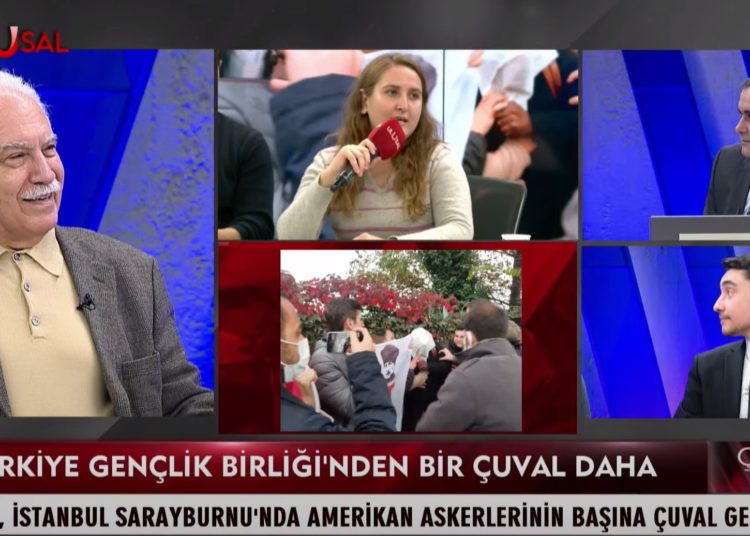Abdullah Bozkurt/Stockholm
A Turkish, pro-Iranian neo-nationalist group allied with the government of President Recep Tayyip Erdoğan openly threatened to attack the US and nine other Western ambassadors following the group’s assault on a US sailor in civilian clothes who was on shore leave in Istanbul.
Naci Önenköprülü, deputy chairman of the Turkish Youth Union (Türkiye Gençlik Birliği in Turkish, or TGB), a neo-nationalist, militant youth group affiliated with obscure politician Doğu Perinçek, said they would attack 10 Western ambassadors in Turkey if they criticize the country. Önenköprülü’s threats were made on Ulusal TV, a group mouthpiece, on November 2, right after the TGB militants attacked a US sailor and put a bag over his head.
The soldier was on shore leave from the US Sixth Fleet command and control ship USS Mount Whitney, which had arrived in Istanbul for a scheduled port visit on November 1, 2021. The TGB ran surveillance on the ship and its crew for hours until the group located an African American sailor walking around alone to stage the attack.
The sailor was overpowered by a group of some 12 to 15 TGB militants who surrounded him while shouting and chanting anti-American slogans and put a bag over his head. The sailor eventually managed to escape, leaving his cap behind. Videotaping and photographing the attack, the TGB publicized the incident, while the group’s leaders were hosted on Ulusal TV next to Perinçek, leader of the Homeland (Vatan, formerly Labor) Party, who applauded the TGB.
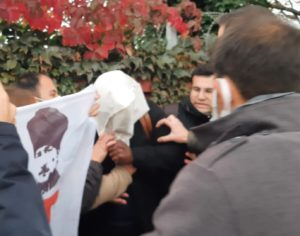
The militants appear to have obtained information about the ship and crew from the Turkish authorities, who in all likelihood knew about the planned attack but did not intervene. Duygu Karabulut, who runs the TGB’s Istanbul operations, openly admitted in televised remarks that the TGB ran surveillance on the ship and its crew for hours before moving ahead with the attack.
“We have been surveilling the ship since morning. We tried to gather information about how long it would stay, and we learned that, too,” said Karabulut, without revealing her source for the information. Turkish authorities must have been aware of the group’s plans in advance and certainly noticed the surveillance activity but opted to not to intervene.
Karabulut claimed the sailor nodded his head at the group’s charges against the US and ran away with a bag on his head, leaving his cap behind.
The Istanbul Governor’s Office said in a statement that 17 suspects were detained by the police in relation to the attack, but the prosecutor who investigated the incident did not request their formal arrest, instead asking the judge at their arraignment to free them all. The judge went along with the prosecutor’s motion and ruled for their release.
The attack was organized to energize the militant group and boost anti-American sentiment in Turkey. Görkem Gözet, deputy chairman of the TGB and one of the planners of the attack, claimed the US is on the run. “America is running away after packing up. There is no need to feel hopeless [against the US]. Our hand is stronger. We are stronger. We mowed them down in Afghanistan, Iraq, Iran and Syria,” he said on TV.
Naci Önenköprülü, another deputy chairman, joined the discussion and recalled how the TGB successfully launched attacks on US troops deployed in Turkey in the past. “We did the same in Hatay province when the US deployed Patriots [against Syrian missile threats] in Turkey. We even infiltrated Incirlik Air Base and put a sack [on a US soldier] inside the base. We did the same in Bodrum,” he said in televised remarks. “After we put our bag over his head, he started running with it on his head. He even had a cap on his head. He forgot that cap, too. If he wants it back, he can contact us,” Önenköprülü added.
Then he moved on to threaten pro-US Turks and Western ambassadors. “As this sack was placed on [US President Joe] Biden’s head, it was also placed on the heads of Biden’s friends in Turkey. Because of this, they are unhappy and sad. As long as they continue with those plans, we will put their heads into these sacks,” he commented. “If the 10 [Western] ambassadors continue to threaten Turkey and the Turkish judiciary, we will bring these bags to their heads as well,” Önenköprülü said.
He was referring to a statement issued on October 18 by the ambassadors of 10 Western nations — the US, Germany, France, the Netherlands, Canada, New Zealand, Norway, Finland, Denmark and Sweden – who jointly called for the release of a jailed philanthropist in compliance with a ruling of the European Court of Human Rights. Five days later President Erdoğan announced that he had instructed his foreign minister to declare them persona non grata and expel them from Turkey.

“I gave the necessary instruction to our foreign minister and said what must be done. ‘These 10 ambassadors must be declared persona non grata at once. You must take care of this immediately,’ I told him,” Erdoğan said in a speech. The Turkish government later reversed its position after it claimed the ambassadors had stepped back from their original statement, an assertion that was challenged by several Western countries including the US.
Three TGB members were detained by the police after the November 2 attack, but it is believed that they will not face any serious criminal charges and will be let go.
This is not the first time Perinçek’s youth group has orchestrated attacks on US soldiers and managed to get away with it due to the group’s connections to Turkish intelligence, the judiciary and the police. The Erdoğan government has proven to be unwilling to press for the successful criminal prosecution of such cases and looks the other way when the neo-nationalists save their militants from any sort of punishment in a court of law.
Examining a series of similar cases in which TGB suspects were acquitted of carrying out physical attacks against US and German soldiers deployed in Turkey as part of a NATO mission or bilateral military cooperation proves that this is part of a pattern rather than an exception. The first case involved TGB members putting a sack on the head of one US sailor identified as Jesus Salazar Munoz, who was on shore leave from the USS Ramage in Bodrum on October 19, 2011.
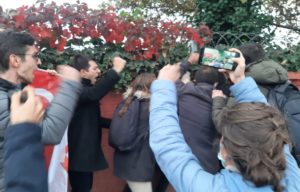
The attackers wrestled the sailor to the ground and put a sack over his head. The prosecutor indicted eight members of the TGB including its General Secretary Özgür Bursalı and Homeland Party Deputy Chairman Utku Reyhan on “deprivation of liberty” and “insult” charges and asked the court to sentence them to up to 16 years, four months, in jail. The other suspects in the case were Halil Umut Alparslan, Mustafa Üzek, Beyhan Korkman, Safa Parlak, Cemil Gözel and Hidayet Dakmaz. However, the Bodrum 3rd High Criminal Court acquitted all of them on February 9, 2016. The court even said the protestors were justified in their act, which was seen as a response to US troops detaining Turkish soldiers in Iraq’s Sulaymaniyah on July 4, 2003 with bags on their heads.
In a twisted case, the court initially said the complaint filed with the police on insult charges by Munoz was not taken through a duly authorized translator. It ruled out the key testimony on procedural grounds years later although there was no reason to do so. Upon a request by the court, Munoz filed a new complaint through legal bilateral channels from the US; yet, the court again ruled that the second complaint was not filed properly, either, creating a pretext to drop the charges.
On the deprivation of liberty charge, the court said the attack was not premeditated, took place in a crowded public place and that the suspects had no intention of kidnapping the victim. That actually contradicted the suspects’ public statements, which showed how they had planned the attack in detail. They had actually bragged about it for quite some time in neo-nationalist media outlets controlled by the Perinçek group. The court even returned the memory cards that the militants used to record the attack and post the footage of the incident on the Internet. The acquittal was deliberate despite abundant evidence in the video recording, witness and victim testimony and wide public coverage in the Turkish media.
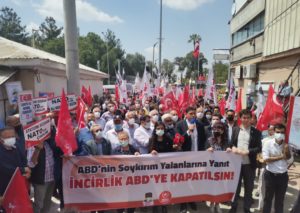
The second incident took place on July 17, 2012 when seven TGB militants planned to assault and put bags over the heads of sailors from the USS Abraham Lincoln, which had docked in Turkey’s Mediterranean port of Antalya. The militants started calling the US sailors murderers and said they did not want to see them in Turkey. Before they were able to execute their plan, the TGB members were detained by plainclothes policemen who were trailing the group on an intel tip. The suspects, identified as Can Aslan, Murathan Demirkıran, Toygar Ateş, Seda Gökalp, Kadir Arıkan, Gözde Topraklar and Soner Keskin, were charged and faced trial.
However, on February 12, 2014, the case ended with the acquittal of all the suspects, who were even given back the confiscated bags they planned to put on the heads of the US sailors. Judges and prosecutors aligned with the Perinçek group turned the case upside down, going so far as accusing the police officers of treating the TGB suspects badly and desecrating a Turkish flag that was waved by TGB members in protest of the US sailors. In a mind-boggling ruling, a female police officer was sentenced to eight months in jail for detaining the TGB suspects. Her conviction was not commuted on the grounds that she did not show any remorse for detaining the suspects even though short sentences rarely result in imprisonment in Turkey.
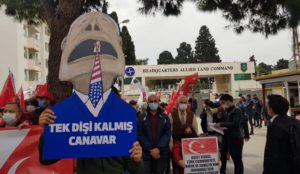
The third incident occurred on January 23, 2013 when TGB militants trailed seven NATO troops who were deployed in İskenderun province as part of a NATO operation to beef up Turkey’s security with Patriot missile batteries against threats originating from Syria. The militants placed bags over the heads of two German soldiers after running them down on the street. Perinçek’s mouthpiece Aydınlık ran a story three days later about how shop owners in the area were very proud of the TGB members for their action. The police rounded up dozens of TGB members including TGB head İlker Yücel, who is now working as the news coordinator for the neo-nationalist Aydınlık daily. In the end, only three suspects were indicted, and the court sentenced them to 87 days in jail at a hearing on February 1, 2016 after a three-year trial. The prison sentence was converted into a fine of TL 740 (approximately $210) — not even a slap on the wrist.
The fourth attack on US/NATO troops was recorded in Istanbul on November 12, 2014 when TGB members attacked and roughed up three US sailors in civilian clothes who were on shore leave. They sprayed them with red paint, and bags were put over their heads by university students who were members of the TGB. The youth group approached the US sailors from the USS Ross as they were trying to use an ATM, struck up a conversation as if they were interested students before they verbally and physically started abusing them.
Perinçek hailed them as heroes and said how proud he was that the attackers were members of his party. His Aydınlık daily featured stories praising them, and Ulusal paraded them on TV. Uğur Aytaç, the then-TGB İstanbul chairman, then-TGB Chairman Çağdaş Cengiz and 10 other militants were detained by the police and questioned. They were referred to the prosecutor, who did not even bother taking their depositions and ordered their release the next day. That again showed how the Perinçek group is protected from any criminal prosecution in the Turkish judiciary.
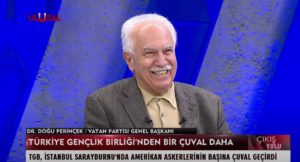
The fifth incident was reported on April 16, 2016 when two TGB militants entered İncirlik Air Base, where US and anti-ISIL coalition partners had deployed troops. The suspects blended into a group of Turkish youths who were at the base to participate in an event marking April 23, National Sovereignty and Children’s Day. After the event was over, the TGB militants started chasing an American soldier named Nicholas Allen Rockwell, trying to put a bag over his head. Punches were thrown, and one attacker said: “Bombs are exploding every day. Every day we receive news of martyred soldiers. You are responsible for that.” Turkish security guards intervened and detained the militants. The suspects, identified as former Adana TGB chairman Yalçın Semir Akarsu and TGB Adana provincial chair Cenk Kızılırmak, were referred to court for arrest, but the judge released them pending trial.
The two along with the mastermind of the attack, Sinan Sungur, a former TGB secretary-general, were indicted on charges of insult and trespassing in a forbidden military zone by the Turkish prosecutor, who demanded 12 years in prison for their crimes. Sungur said they had been waiting to stage such an attack for two years and that the April 23 event gave them the opportunity. It suggested the group had good intelligence and operational capabilities. They must have had inside help to pull off such a stunt; yet all the suspects who were detained were immediately released from custody. In the first hearing held on October 20, 2016 by the Adana 20th High Criminal Court, the judicial supervision of the suspects was lifted as well. Fırat Kayaönü, lawyer for the suspects, told the court he would have done the same if he had been in their shoes. The second hearing was held on January 27, 2017 and the third on May 18, 2017. All the suspects were acquitted of charges in October 2018.
Sungur was rewarded for his militant acts and made editor-in-chief of Ulusal TV. He was honored in Iran during a trip there.
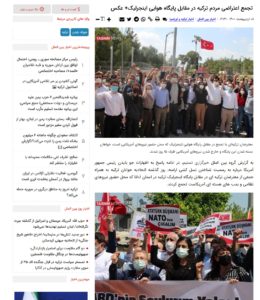
The Perinçek group and its militant youth organization have been prosecuted and investigated in Turkey, but all criminal cases involving the group were derailed and thwarted by Erdoğan when he secretly made a deal with the neo-nationalists in the aftermath of the December 17-25, 2013 corruption investigations that incriminated Erdoğan, his family members and his business and political associates. To save himself from serious legal troubles, Erdoğan helped secure the release of Perinçek and his cronies who were convicted on serious charges and an abundance of evidence. What is more, the prosecutors, police chiefs and judges who oversaw their cases were dismissed, purged and arrested on fabricated charges and alleged links to the Gülen movement, which Erdoğan declared an enemy after the graft scandal.
As a result, the prosecutors who had been investigating the TGB network for incitement to violence since 2011 were sacked by the Erdoğan government. The new prosecutor in Ankara, Serdar Coşkun, a pro-Erdoğan loyalist, decided to drop the probe into the TGB on October 31, 2014. Coşkun said the TGB actions should be considered part of the freedom to protest, freedom of assembly and freedom of thought. Coşkun is now busy going after the opponents of Erdoğan’s authoritarian regime.
The case reveals how things changed dramatically in the criminal justice system when Erdoğan struck the deal with Perinçek. The last order to authorize the wiretapping of TGB leaders by a judge was issued on February 13, 2014, almost two months after the graft probes. Now this fanatical group, estimated to have around 100,000 members with at least 10,000 activists according to the TGB’s own account, continues to run amok in Turkey in line with a full-frenzy, anti-US and anti-NATO conspiracy. They are organized in 64 cities in Turkey and 20 capitals in Europe, and in almost all cities in Germany, where 3 million Turks live. Incidentally, the TGB and others are also strongly supported by an influential neo-nationalist faction within Turkey’s main opposition Republican People’s Party (CHP).
The Homeland Party and its youth branch the TGB continue to fan anti-US sentiment in Turkey with blanket support from the Erdoğan government. The TGB have organized rallies in front of the US Embassy and its consulates and organized marches at Incirlik Air Base, demanding the expulsion of US troops from Turkey.

